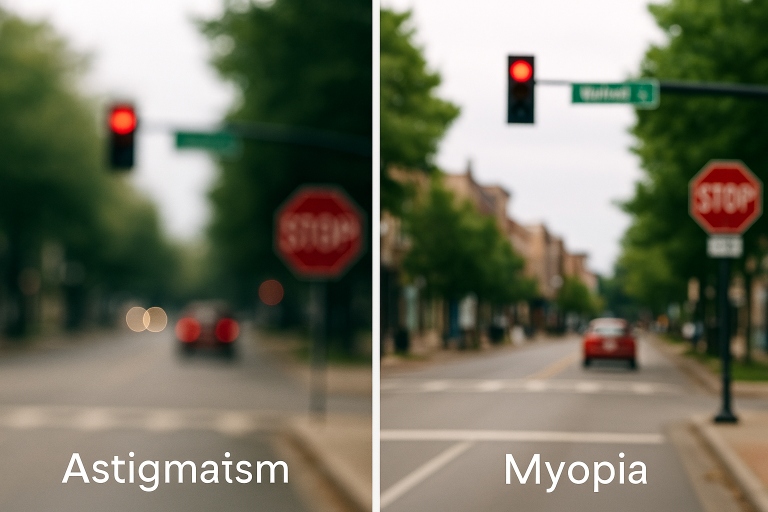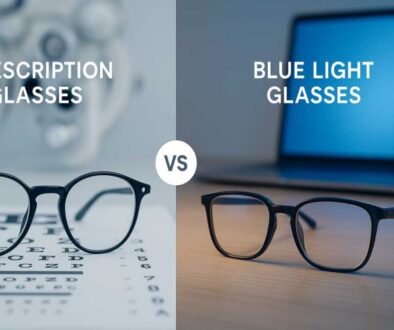Astigmatism vs. Myopia: What’s the Difference?

Astigmatism Symptoms & Treatment
Astigmatism is a common refractive error affecting how your eyes focus light. Unlike a perfectly rounded cornea (shaped like a soccer ball), astigmatism causes an irregular, football-like curvature in the cornea or lens. This uneven shape scatters light instead of focusing it sharply on the retina, leading to blurred or distorted vision at any distance.
Key symptoms include:
-
Blurry vision at all ranges
-
Persistent eye strain
-
Frequent headaches
-
Night driving difficulties
Severity ranges from mild cases needing no correction to significant astigmatism requiring vision aids. At Poudre Valley EyeCare in Fort Collins, our optometrists diagnose astigmatism through comprehensive eye exams.
Tailored treatments include:
-
Specialty contact lenses
Myopia Symptoms & Correction
Myopia (nearsightedness) develops when an elongated eye focuses light in front of the retina instead of directly on it. This causes distant objects like road signs or classroom boards to blur while close-up activities such as reading stay clear. Typically emerging in childhood, myopia often worsens without intervention.
Common symptoms include:
-
Blurry distance vision
-
Frequent squinting
-
Headaches during visual tasks
At Poudre Valley EyeCare in Fort Collins, our optometrists diagnose myopia through comprehensive eye exams, precisely mapping how light focuses in your eyes.
We offer personalized solutions:
-
Custom prescription glasses
-
Specialty contact lenses
Astigmatism vs. Myopia: Key Differences & Treatment Options in Fort Collins
Astigmatism and myopia are distinct refractive errors requiring precise correction. Here’s how they differ:
Astigmatism:
-
Cause: Football-shaped cornea/lens
-
Effect: Blurred vision at all distances (near/far)
-
Example: Difficulty reading street signs and text messages
Myopia (Nearsightedness):
-
Cause: Elongated eyeball
-
Effect: Clear close vision but blurry distant objects
-
Example: Struggling to see whiteboards or road signs
Common Ground: Shared Symptoms & Solutions for Astigmatism and Myopia
While astigmatism and myopia differ fundamentally, they share critical similarities:
-
Symptom overlap: Headaches and eye strain
-
Correction needs: Require glasses, contacts, or surgery
-
Diagnostic accessibility: Detectable through comprehensive eye exams
Personalized Vision Correction: Treating Astigmatism & Myopia at Poudre Valley Eyecare
Poudre Valley Eyecare in Fort Collins offers tailored solutions for astigmatism and myopia:
-
Custom Eyeglasses: Precision lenses through our Eyemart partnership, designed for your unique prescription.
-
Specialty Contacts: Expertly fitted to your eye shape and lifestyle needs.
-
LASIK Co-Management: Coordinated care with top local surgeons for permanent vision correction.
-
Ortho-K Therapy: Overnight corneal reshaping for glasses-free daytime clarity
Proactive Eye Health: Preventing Progression
While astigmatism and myopia can’t always be prevented, early management protects vision. Key Fort Collins-specific strategies:
-
Genetic Awareness: Monitor vision if family history exists.
-
Digital Eye Care: Follow the 20-20-20 rule (essential for CSU remote workers and tech professionals).
-
Outdoor Balance: 1-2 hours daily at City Park or Spring Canyon reduces childhood myopia risk.
Early Detection: Protecting Fort Collins Families’ Vision
Critical steps for Northern Colorado families:
-
First Exam by Age 3: Vital if children squint or sit close to screens.
-
School Partnerships: Free vision checks through Poudre School District collaboration.
-
Home Environment:
-
Bright natural lighting for homework (avoid dim spaces like The Bean Cycle).
-
The pre-bedtime device limits to minimize strain.
-
Thriving in Fort Collins: Vision-Friendly Lifestyle Tips
Adapt seamlessly to Northern Colorado living:
-
Night Driving Solutions: Anti-glare lenses for Riverside Avenue’s low-light conditions.
-
Adventure Readiness: UV400 wraparound sunglasses for Horsetooth hikes or Poudre Trail biking.
-
Digital Wellness: Blue-light protection for Woodward/HP professionals.
Local Activity Optimization:
-
Sports: Polycarbonate lenses at Fort Collins Soccer Club matches.
-
CSU Studies: Anti-fatigue glasses for Morgan Library sessions.
-
Winter Prep: Anti-fog coatings for Old Town explorations.
Conclusion
Whether you’re squinting to see distant objects or struggling with blurry vision at any distance, it’s important to understand the differences between astigmatism and myopia. Both are common eye conditions that can be easily managed with the right care and treatment.
At Poudre Valley Eyecare, our focus is you. We’re committed to providing the best eye care in Fort Collins, using the latest technology to diagnose and treat your vision problems. If you’re experiencing symptoms of astigmatism or myopia, don’t hesitate to schedule a comprehensive eye exam with us today. Clear vision is just an appointment away.
FAQs
-
What is the difference between astigmatism and myopia?
Astigmatism and myopia are two types of refractive errors that affect vision. Myopia, or nearsightedness, occurs when the eye is too long or the cornea is too curved, causing distant objects to appear blurry. Astigmatism, on the other hand, is caused by an irregular shape of the cornea or lens, leading to distorted or blurry vision at any distance.
-
How can an eye exam help in diagnosing myopia and astigmatism?
-
Can myopia and astigmatism occur together?
-
What are the common symptoms of astigmatism and myopia?
-
How is managing myopia different from treating astigmatism?
-
What role does the shape of the eye play in astigmatism and myopia?
-
Can degenerative myopia worsen over time?
-
How can I tell if I have astigmatism or myopia?
-
Are there specific treatments for high myopia compared to astigmatism?
-
How is astigmatism diagnosed?
-
How is myopia diagnosed?
-
Is astigmatism more common than myopia?
-
At what age does myopia typically develop?
-
What kind of eyeglasses are prescribed for astigmatism vs. myopia?
Our website and online content are for informational purposes only and should not be considered personalized medical advice. Please book an appointment if you’d like personalized advice from a medical professional.
Dr. Eric Torgerson
Owner at Poudre Valley Eyecare
Dr. Eric Torgerson is the owner of Poudre Valley Eyecare, and has been recognized for his contributions to optometry and his commitment to community health through various roles and accolades within the Northern Colorado Optometric Society and the Colorado Optometric Association.
Why Choose Us?
Our advanced technology and individualized care deliver results for patients of all ages. Our routine exams allow us to spot changes in your vision and allow us to treat those changes early. We have a comprehensive understanding of eye care, which means we can treat a wide range of conditions and chronic diseases. Our in-depth routine exams and customized treatment plans set us apart from the rest.


Please note: None of the above should be considered medical advice. If you’re having any concerns about your vision, please reach out to us immediately or see your primary care provider.




